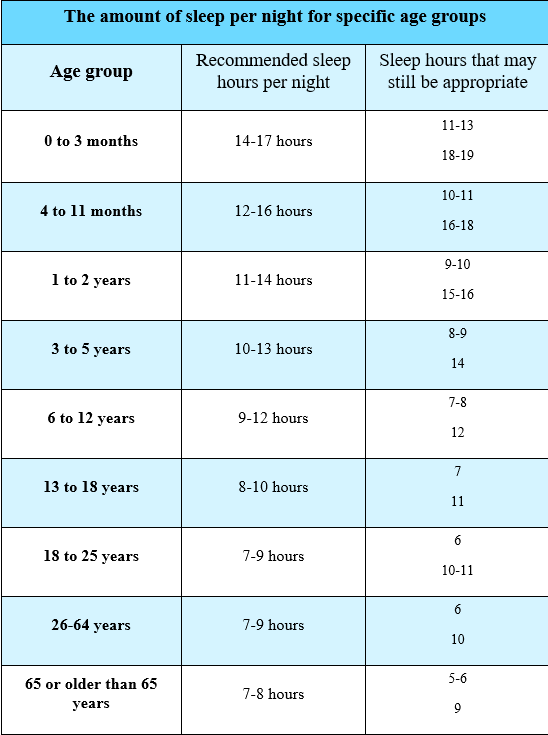The answer is: it depends. Each individual has their own specific sleep needs depending on their age, their specific genetic makeup, their circadian rhythms, and several other factors.
To find out how much sleep you should be getting, you could experiment and find out for yourself. One method to figure out your individualized sleep needs is by using a sleep calculator.
In addition to that, there are certain general guidelines that could help you guess the amount of sleep you should be getting depending on your age, and it’s recommended to start experimenting from there.

The data of this table is obtained from a literature review written in 2015. 1
Age group is one of the factors that determine how many hours of sleep an individual should get. As it is clearly demonstrated by the table above, your sleep needs are different at different times of your lifespan.
The required amount of sleep also varies in individuals within the same age group. For example, the general recommendation of sleep hours for adults aged between 18-64 years is 7 to 9 hours each night. However, certain people could still get enough sleep in 6 hours or in 10-11 hours.
In other words, some people might require 10-11 hours to function normally and feel rested, while others in the same age group experience the same results with only 6 hours of sleep.
In addition, each individual’s sleep needs increase while having an infection or a disease, all the recommended hours in this article apply only to healthy people.
While the quantity of sleep is important, you shouldn’t depend on a single factor when it comes to improving your sleep. Scientists recommend prioritizing both sleep quality and quantity.
In other words, just because you get 7-9 hours of sleep a night doesn’t mean you will feel well rested the next day. Another aspect which magnificently affects your health is your sleep quality.
Your sleep will still be considered poor if you don’t feel rested after getting a good amount of sleep, which precisely demonstrates the importance of the quality of your sleep.
Click to read about how you can make your sleep quality better.
1. Hirshkowitz, M., Whiton, K., Albert, S.M., Alessi, C., Bruni, O., DonCarlos, L., Hazen, N., Herman, J., Katz, E.S., Kheirandish-Gozal, L. and Neubauer, D.N., 2015. National Sleep Foundation’s sleep time duration recommendations: methodology and results summary. Sleep health, 1(1), pp.40-43.
https://pubmed.ncbi.nlm.nih.gov/29073412/
Sleep affects almost all aspects of your well-being, from your physical to your mental health. Click here to find out why is sleep so important.

The urethra is a muscular canal that extends from the neck of the bladder to the exterior of body. Read more about the anatomy of urethra in this article.

Dosage guide of Lisinopril: Click to read about the dose for your specific condition and age group.

Learn about medical uses, safety profile, mechanisms and interactions of statins.

Comprehensive guide on Ozempic (semaglutide), including its uses, dosage, side effects, warnings, and interactions.
.png)